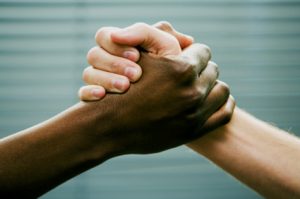It is human nature that everyone reacts in some way or the other when they meet people from different backgrounds. And often people jump to assumptions and make judgements regarding someone’s ethnicity. Not only this, certain people tend to devalue others’ identity and label them on the basis of their colour, cast, creed and sometimes personal insecurities. In such a situation anybody belonging to a particular race is ridiculed and treated as an outcast by racists all around the world.
But what is racism? To put it in simple words it is something destructive which destroys community cohesion and creates divisions in society. Racism is influenced by a range of historical, social, political and economic factors. It has its roots in the belief that some people are superior because they belong to a particular race, ethnic or national group.
Sadly, many of us have been victims of racism at some point in our lives. And one can’t deny the fact that people living abroad mostly bear the brunt of the nuisance called racism. Moreover, if we look from a broader perspective, people often subconsciously start discriminating even when they don’t intend to differentiate between ‘them’ and ‘others’. This becomes quite demotivating for the ones who have left their home grounds to work in foreign countries in order to provide their families a better lifestyle. However, not everyone is a racist; there are people who treat others with equality and respect as well. This week, You! narrates the stories of a few people, belonging to different fields, who face racial discrimination on regular basis while living abroad.
Rabia Khan
Rabia, who has recently moved to Mississauga (Canada) from Pakistan, is working as a Customers’ Representative in a bank. According to her, “Usually people feel uncomfortable when I tell them I am from Pakistan, and give a smirk. They might have wrong perceptions about our country’s educational standards that they ask me how come I have such a good accent. I tell them that we have good schools in Pakistan too. Because of their generalized viewpoints, they are often surprised to see my ‘white complexion’ and think that maybe I am from Romania. They don’t even know that some regions in Pakistan have people with fair colour and good spoken skills,” shares Khan.
M. Muzaffar Malik
34-year-old Muzaffar is a Chemical Engineer, working at Suncor Energy in Fort McMurray, Alberta, Canada. He has been settled there for almost four years now along with his family. “There are always two sides of the story. I won’t say everyone is a racist here; I live in an area where most of the people are immigrants, so we share a harmonious environment. On the other hand, various racial differences can be seen among the natives here. It has almost become a routine for us to experience people judging us with a discriminating eye. Usually, when we take our children for rides in the park, white parents take their children away from the rides and leave, which is sad,” enunciates Malik.
Abid Saeed
Working at a local college as an International Student Coordinator in Calgary, Canada, for the past two years, Saeed says, “Usually the yellows (Chinese and Pilipino), browns (Indians and Pakistanis) or the whites, everyone criticizes the other. What I have experienced at work is that brown people, living there for a long time, have a discriminatory attitude towards browns. It is due to job insecurity that they give a tough time to the new immigrants.”
Tehreem Ahmed
Tehreem has been living in London from many years now. As such she and her parents have never experienced any attacks based on racism but on the flip side, she accepts that racism has its roots in the mindset of people in England. “Sometimes in job interviews, few companies give preferences to a white person rather than an Asian, even if they are equally qualified. This has happened to my brother after his graduation,” laments Ahmed.
Waqas Durrani
A software engineering student living in Chicago, USA, says how few people ask him to go back to Pakistan and that he has no future in the US. “However, I have come across many humble people (whites and blacks), who are very helpful and appreciate me for my efforts of studying abroad,” tells Waqas.
Sadia Sarfaraz
A housewife living in Calgary gives us a diversified view. “If you are rich, you can gel with people easily no matter what race you belong to. Those who share the same financial backgrounds or know ‘what makes the whites happy’ can survive easily. But, Canada is a multicultural place so most of the time people also show acceptability towards brown people,” apprises Sadia.
Aisha Umair
“In Australia, people are not that finicky when it comes to another race,” explains Aisha from Melbourne. “I see women in hijab who roam around freely; I also observe hijab and have never faced any disrespectful comments. Even publicly, we have never come across any hateful behaviour from white people. However, they don’t tolerate browns when it comes to working in Australia. My husband often tells me how they only prefer whites over desi(s),” she states.
In a nutshell…
The few examples that we have cited above clearly show that racism exists at all levels. We cannot label any particular race, neither can we say that whites discriminate against desi(s) or any other race as a matter of fact. In many cases we even see people from the same country/race pulling down each other just for the sake of satisfying their insecurities.
The fact is that racism is a global phenomenon which actually depends on how a person has been brought up, what kind of values have been inculcated while growing up and what factors impact one’s thinking. It is a never ending debate but in order to put an end to this nuisance we need to stick to the basics – tolerance, acceptance and love for mankind.
By Iqra Sarfaraz
Source: The news magazine










Comments